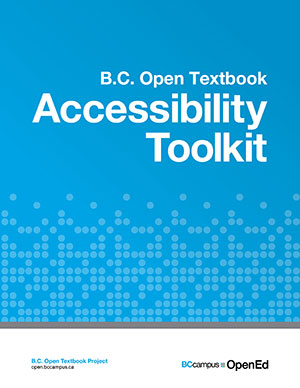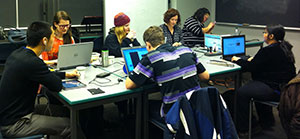Opening the Doors to Education: Ensuring Accessibility in Open Textbooks
Published by: WCET | 4/1/2015
Tags: Access, Accessibility, Digital Learning, Open Educational Resources, Standards, Textbooks
Published by: WCET | 4/1/2015
Tags: Access, Accessibility, Digital Learning, Open Educational Resources, Standards, Textbooks
Accessibility is a concern across all of technology-enhanced education. At BCcampus, they wanted to help content creators incorporate accessible practices into their open materials. Amanda Coolidge, Open Education manager at BCcampus, shares with us how they crafted the BC Open Textbook Accessibility Toolkit and how you can take advantage of this great resource.
The BC Open Textbook Accessibility Toolkit is a collaboration between BCcampus and the Centre for Accessible Post-secondary Education Resources BC (CAPER-BC). BCcampus is a publicly funded organization that uses information technology to connect the expertise, programs, and resources of all B.C. post-secondary institutions under a collaborative service delivery framework. BCcampus is the lead organization for the BC Open Textbook project. CAPER-BC provides accessible learning and teaching materials to students and instructors who cannot use conventional print because of disabilities.
 At the end of 2014, BCcampus and (CAPER-BC) contacted the Disability Services Coordinators at partner institutions to find student participants with print disabilities to evaluate British Columbia (B.C.) open textbooks. The participants were asked to evaluate five chapters from the open textbook library and provide their evaluation on each chapter. They were asked to access the materials in their preferred layout, such as web format, ePub, or PDF, and then provide written feedback about their experience. This model worked well, but we decided to take this further and invited the participants to join us for a half-day focus group, where we had the opportunity to understand why they responded to the questions – or didn’t respond – to see how they were reading and accessing the materials on their different devices. Based on student feedback, we were able to create a series of tasks to make our own textbooks more accessible.
At the end of 2014, BCcampus and (CAPER-BC) contacted the Disability Services Coordinators at partner institutions to find student participants with print disabilities to evaluate British Columbia (B.C.) open textbooks. The participants were asked to evaluate five chapters from the open textbook library and provide their evaluation on each chapter. They were asked to access the materials in their preferred layout, such as web format, ePub, or PDF, and then provide written feedback about their experience. This model worked well, but we decided to take this further and invited the participants to join us for a half-day focus group, where we had the opportunity to understand why they responded to the questions – or didn’t respond – to see how they were reading and accessing the materials on their different devices. Based on student feedback, we were able to create a series of tasks to make our own textbooks more accessible.
Working with Tara Robertson from CAPER-BC, and Sue Doner, an instructional designer from Camosun College who has been working with universal design and creating accessibility guides for instructors, we have developed an accessibility toolkit. The goal of the BC Open Textbook Accessibility Toolkit is to provide the needed resources needed to each content creator, instructional designer, educational technologist, librarian, administrator, and teaching assistant to create a truly open and accessible textbook — one that is free and accessible for all students.
We developed the toolkit in Pressbooks, and as a result it is available in a variety of downloadable formats (PDF, EPUB, MOBI, XHTML, and WordPress XML). Within the toolkit you will find information on how to make content accessible, with specifics on:
 As you work through the content of the BC Open Textbook Accessibility Toolkit, you will find that the suggestions provided are intended for the non-technical user. If you are looking for more technical descriptions of how to make your work accessible, we suggest you review the WCAG (Web Content Accessibility Guidelines).
As you work through the content of the BC Open Textbook Accessibility Toolkit, you will find that the suggestions provided are intended for the non-technical user. If you are looking for more technical descriptions of how to make your work accessible, we suggest you review the WCAG (Web Content Accessibility Guidelines).
Based on some of the accessibility testing we conducted, our technical team at BCcampus is creating a new accessibility plug in for Pressbooks. The plug-in will give users the option to modify the user interface and the exports’ interface, font size, and line spacing for accessibility purposes.
If you have comments, suggestions, or questions about the BC Open Textbook Accessibility Toolkit we would love to hear from you. Please contact us at opentext@bccampus.ca
 Amanda Coolidge
Amanda Coolidge
Manager, Open Education
BCcampus
Twitter: @acoolidge